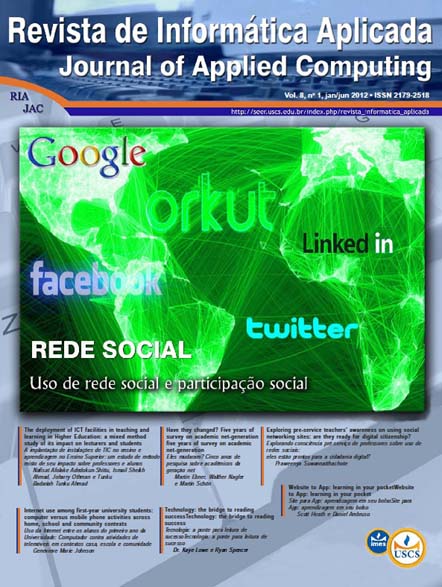Eles Mudaram? Cinco Anos de Pesquisa Sobre Acadêmicos da Geração Net
DOI:
https://doi.org/10.13037/ria.vol8n1.1901Abstract
At Graz University of Technology (TU Graz) a questionnaire amongst freshmen is carried outeach year since 2007. Aim of this poll is to check IT and Web 2.0 competences and skills of the newstudents coming to TU Graz in order to adapt the e-learning services for their study at TU Graz. Furthermorethe results mirror current trends and changing behaviors of young people said to be the net-generationoften postulated to which we and our teachers will face to. After five years of investigations time hascome to take a look back and reel up processes and progresses not only because five years match thestandard duration of a study at TU Graz. Which trends have been established, which assumptions did notarrive, what happened totally unexpected? This paper targets the main changes within the last five yearsdue to this subject. It compares the five study years and outlines the current study results of 2011 in. Oneof the main results over five years is that the net-generation did arrive but slowly adapt their study life towhat they are already used to do in private.Downloads
References
BULLEN, M., MORGAN, T., BELFER, K. & OAYYUM, A (2008). The digital learner at BCIT and implications for an e-strategy. EDEN, Paris, France.
CONOLE, G., DE LAAT, M., DILLON, T., & DARBY, J. (2006). LXP:Student experiences of technologies. Final Report: JISC UK. Retrieved December 2008 from http://www.jisc.ac.uk/whatwedo/ programmes/elearningpedagogy/ learneroutcomes [December 2011]
EBNER, M., SCHIEFNER, M., & NAGLER, W. (2008). Has the Net-Generation Arrived at the University? oder Studierende von Heute, Digital Natives? Offener Bildungsraum Hochschule, Medien in der Wissenschaft, 48, 113-123.
EBNER, M., & NAGLER, W. (2010). Has Web2.0 Reached the Educated Top?. EdMedia International Conference 2010, AACE, 4001-4010.
EBNER, M., NAGLER, W., SCHON, M. (2011a) The Facebook Generation Boon or Bane for ELearning at Universities?. in: World Conference on Educational Multimedia, Hypermedia and Telecom-communications, p. 3549-3557
EBNER, M.; SCHON (aka SCHAFFERT), S., TARAGHI, B., DRACHSLER, H., TSANG, P. (2011b) First steps towards an integration of a Personal Learning Environment at university level. in: ICT 2011, p. 22 - 36
GREEN, H. & HANNON, C. (2007). Their Space: Education for a digital generation. London: DEMOS. Retrieved from: http://www.demos.co.uk/files/ Their%20space%20-%20web.pdf [December 2011]
KLEIMANN, B., ÖZKILIC, M. & GÖCKS, M. (2008). HISBUS-Kurzinformation,Studieren im Web 2.0, Project Report, https://hisbus.his.de/hisbus/docs/ hisbus21.pdf [December 2011]
JIM STUDY (2008). JIM 2008, Jugend, Information, (Multi-)Media - Basisstudie zum Medienumgang 12- bis 19-jähriger in Deutschland, http:// www.mpfs.de/fileadmin/JIM-pdf08/JIMStudie_2008.pdf [December 2011]
MARGARYAN, A., & LITTLEJOHN, A. (2008). Are digital natives a myth or reality?: Students' use of technologies for learning. Draft paper.
NAGLER, W., & EBNER, M. (2009). Is Your University Ready For the Ne(x)t Generation?. EdMedia International Conference 2009, AACE, 4344-4351.
NAGLER, W., GRIGIORADIS, Y., EBNER, M., SCHÖN, M. (2011) Podcasting De Luxe - Lecture Recording at Graz University of Technology, EADIM conference, Graz 2011, in print
OBLINGER, D. D. & OBLINGER, J. L. (Hrsg.). (2005). Educating the Net Generation, http:// www.educause.edu/educatingthenetgen [December 2011]
OBLINGER, J. L. (2005). Is it age for IT: First steps Towards Understanding the Net Generation, li D. D. Oblinger & J. L. Oblinger (Hrsg.). Educating the Net Generation, (p. 2.1-1.5) http:// www.educause.edu/ir/library/pdf/pub7101b.pdf [December 2011]
OPASCHOWSKI, H. W. (1999). Generation @, Die Medienrevolution entläßt ihre Kinder: Leben im Informationszeitalter. Hamburg/Ostfildern: Kurt Mair Verlag
PELEVIN, V. & BROMFIELD, A. (2002). Homo Zapiens. Penguin
PRENSKY, M. (2001). Digital natives, Digital Immigrants, On the Horizon, 9 (5), p. 1-6.
SCHULMEISTER, R. (2009). Studierende, Internet, ELearning und Web 2.0. GMW09, 129-140. http:/ /www.jstatsoft.org/v16/i10/paper [December 2011]
SCHULMEISTER, R. (2010). Gibt es eine Net Generation? [Does the Net Generation exist?]. Germany: University of Hamburg. Retrieved February 2010 from http://www.zhw.unihamburg.de/uploads/schulmeister-netgeneration_v3.pdf [December 2011]
STATISTA By IBM SPSS (2011a). Wie werden Ihrer Meinung nach in 10 Jahren in Deutschland Bücher gelesen werden? Retrieved december 2011 from http://de.statista.com/statistik/daten/studie/ 208244/umfrage/buecher-lesen-papier-vs-ebook/ [December 2011]
STATISTA by IBM SPSS (2011b). Anteil der Internetnutzer, die ihr Handy für den mobilen Internetzugang nutzen in den Jahren 2008 bis 2011? Retrieved december 2011 from http:// de.statista.com/statistik/daten/studie/197383/ umfrage/mobile-internetnutzung-ueber-handyin-deutschland/ [December 2011]
TAPSCOTT, D. (1997). Growing up digital: The Rise of the Net Generation. McGrwa-Hill, New York
Downloads
Published
Issue
Section
License
Copyright (c) 2012 Martin Ebner, Walther Nagler, Martin Schön

This work is licensed under a Creative Commons Attribution-NonCommercial-ShareAlike 4.0 International License.
Os autores que publicam trabalhos na RIA estão de acordo com os seguintes termos:
- Autores mantêm seus direitos autorais e concedem à RIA o direito à primeira publicação. Admite-se o compartilhamento do referido trabalho, desde que seja reconhecida sua autoria e publicação inicial nesta revista.
- Autores podem fechar contratos adicionais separadamente, para distribuição não exclusiva da versão do trabalho publicado na RIA, com reconhecimento de sua autoria e publicação inicial nesta revista.
- Autores podem publicar e distribuir seu trabalho online, antes ou durante o processo editorial.


